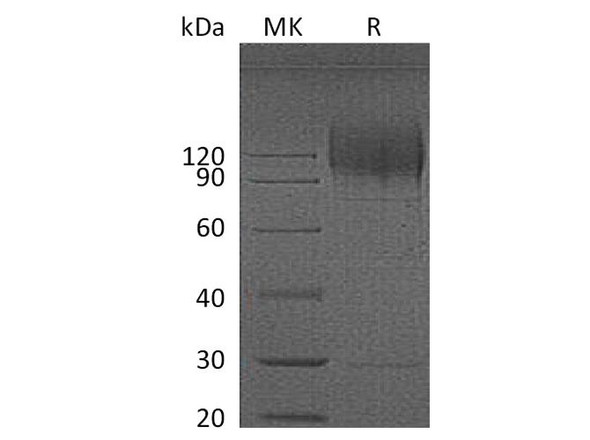Viral Recombinant Proteins
HIV-2 gp36 Recombinant Protein (RPPB5947)
- SKU:
- RPPB5947
- Product Type:
- Recombinant Protein
- Species:
- Viral
Description
| Product Name: | HIV-2 gp36 Recombinant Protein |
| Product Code: | RPPB5947 |
| Size: | 0.5mg |
| Species: | HIV-2 |
| Target: | gp36 |
| Source: | Synthetic |
| Physical Appearance: | Sterile filtered colorless clear solution. |
| Formulation: | (1mg/1ml) in H2O. |
| Stability: | HIV-2 gp36 although stable at 4°C for 1 week, should be stored below -18°C. Please prevent freeze thaw cycles. |
| Purity: | Greater than 95.0% as determined by HPLC. |
HIV-1 and HIV-2 appear to package their RNA differently. HIV-1 binds to any appropriate RNA whereas HIV-2 preferentially binds to mRNA which creates the Gag protein itself. This means that HIV-1 is better able to mutate. HIV-2 is transmitted in the same ways as HIV-1: Through exposure to bodily fluids such as blood, semen, tears and vaginal fluids. Immunodeficiency develops more slowly with HIV-2.HIV-2 is less infectious in the early stages of the virus than with HIV-1.The infectiousness of HIV-2 increases as the virus progresses.Major differences include reduced pathogenicity of HIV-2 relative to HIV-1, enhanced immune control of HIV-2 infection and often some degree of CD4-independence. Despite considerable sequence and phenotypic differences between HIV-1 and 2 envelopes, structurally they are quite similar. Both membrane-anchored proteins eventually form the 6-helix bundles from the N-terminal and C-terminal regions of the ectodomain, which is common to many viral and cellular fusion proteins and which seems to drive fusion. HIV-1 gp41 helical regions can form more stable 6-helix bundles than HIV-2 gp41 helical regions however HIV-2 fusion occurs at a lower threshold temperature (25�C), does not require Ca2+ in the medium, is insensitive to treatment of target cells with cytochalasin B, and is not affected by target membrane glycosphingolipid composition.
HIV-2 gp36 is full length chemically synthesized polypeptide sequence of HIV-2 envelope immunodominant regions.






